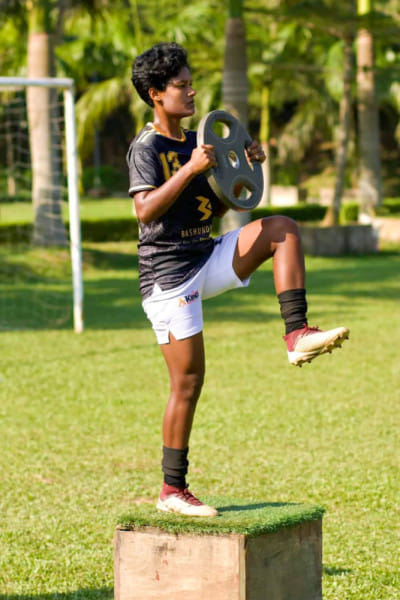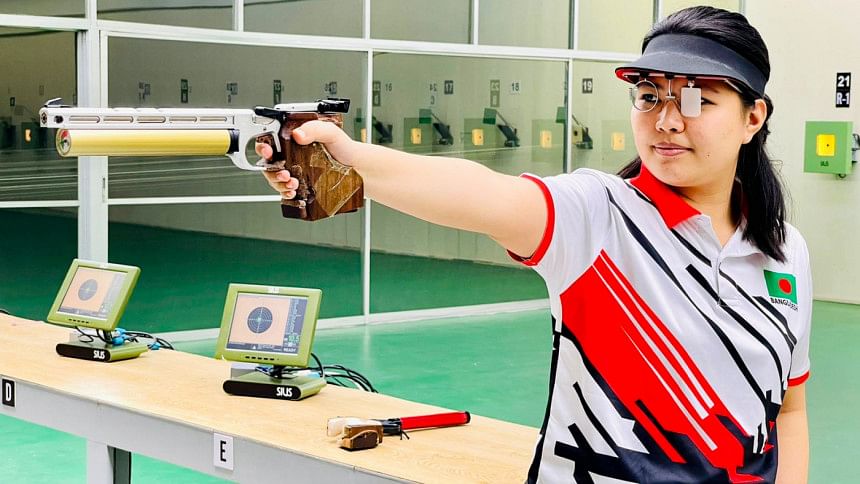Are we doing enough for aspiring young female athletes?

The Bengal Tigresses' triumph at the SAFF Women's Championship last month was a remarkable milestone. It's living proof of these women's determination and capabilities despite hailing from a country that barely cares about accommodating their basic facilities.
However, if that's the condition a national women's team had to endure before they brought glory, what's it like for the young athletes only starting out in this country? Are we at least as vigilant about the accessibility of sports for women as we are quick to celebrate their victories?
A fair bit of family support goes a long way in a country where sports is essentially considered taboo for women. But the primary barriers girls face in regards to sports come from the families themselves.

Many young girls are forced to dress according to outdated regulations and maintain strict curfews. For girls pursuing sports through whatever little scope that they can access, the curfews turn into restrictions on attending matches. Wearing activewear is met with judgement sprouting from irrational sexualisation. The ignorant beliefs that link various health issues to women doing sports are often provided as justification.
Fabiha Anbar, a 19-year-old A-level candidate, says, "I got my period when I was 11. I was scared since this was very new to me and didn't know why it was happening. My mom told me it was because I was overworking my body by playing handball and it was too early to start menstruating. I was too scared to continue sports after that."
Eventually, this stream of judgements and ridiculous prejudices turn into continuous verbal abuse or worse if one decides to be rebellious. Sometimes, it's simply too much to go through, and results in many girls quitting sports entirely before they even start out.
Aisha Habib, 18, is student at Birshreshtha Noor Mohammad Public College. She says, "Back in class 6, my parents opposed my will to learn taekwondo and participate in other sports. I was told that my body would become too manly, making me undesirable for marriage. I have never been able to play as these remarks demotivated me to the core."

However, support from an understanding family is essential to boost confidence and provide reassurance.
Tasnia Chowdhury Tuha, a 12th grader at Bangladesh International Tutorial Limited says, "Initially, my parents were hesitant. However, when I started to inhibit healthier habits and brought home multiple trophies, they began to understand. They're now the first ones to defend me when misogynist comments arise."
Tuha's confidence due to her parents' continued support has taken her a long way. She was the first female athlete at Next Level Sports Management (NLSM). However, she noticed how more girls joined soon afterwards. This, in itself, is an achievement that is often overlooked.
Another prominent concern for the sportswomen in this country is the lack of usable public spaces and the problems it causes. Most public fields and courts are occupied by male players. Even in institutional and residential areas with multiple fields, none are ever specifically designated or rented out to female players without pointed questions or safety concerns.

Deshi Ballers is a female-led sports development organisation working to create a platform for Bangladeshi women and girls to be empowered through basketball. Ashreen Mridha, one of its co-founders, says, "Managing courts for my girls to play in is a constant battle. When we reached out to schools for the cause, they refused to cooperate despite having courts that are rarely used. There have been instances where we were straight up told to leave premises in the middle of a game without any valid explanation as well."
Due to the aforementioned lack of space, many girls have to opt for playing in the same field with male players, resulting in an unfair imbalance and countless instances of sexual harassment.
"I used to play with boys my age on the field near my area when I was young. There weren't many girls, and one day I was the only girl playing. While passing the field, an elderly called me and practically screamed at me for "being insolent" and "showing off my body to the public", in front of everyone present. I was 13 years old," says Tanisha Sayed, now 19, an HSC candidate from Mohammadpur Preparatory School & College.
Educational institutions, unfortunately, are not an exception either. In co-ed schools where there are both male and female sports teams, discrimination in regards to funding and facilities is very evident.

Sultana*, currently a first-year student at Dhaka University says, "In the co-ed school I attended, none of the girls at my school were allowed to play or even use the field. The boys were allowed to play even on the weekends."
Female sports teams usually do not receive much incentive from the school authorities in regards to arranging and entering practice sessions, matches, and competitions, although it's the opposite for male teams.
Besides, since there's very little emphasis on employing skilled female coaches, the girls' teams are often coached by male instructors. It's not necessarily a problem, but many male coaches rarely realise gender-specific requirements and issues when it comes to sports and cannot cater accordingly.
Some can be inappropriate in their behaviour towards the female students. This is also why said arrangement doesn't sit well with many parents, who can then restrict their daughters from pursuing sports as part of the school team.
On this issue, Ashreen says, "Parents usually prefer their daughters to play in the presence of a female coach as it reassures them of their safety and sufficient care. Honestly, it's understandable because back when I was a young player myself, I never had a female coach. There were certain issues I couldn't comfortably share with my male coach, which could've been much easier if I had a woman to look up to as well."
However, the problems discussed here is only the tip of the iceberg. The misery of our sportswomen does not end even after bringing home national level honours. Rather, in national teams, they are only presented with bigger issues like ridiculous wage gaps and an absolute lack of facilities, funding, and recognition in comparison to their male counterparts. These factors largely contribute to young women's unwillingness to pursue sports as a permanent, viable career despite having the potential.
When speaking to The Daily Star for a different article, Rumana Ahmed, a batter for the women's national cricket team, said that she fails to understand why the difference in payment is so huge.

"We are professional cricketers. We call ourselves cricketers and not women cricketers. We play on the same pitch and the same ground as the men and we work just as hard. For the amount of work that we do, we don't earn enough," she said.
Efforts made by the national authorities concerned for the betterment of women's sports is non-existent, and they keep getting away with having zero accountability for it. Every time the shortcomings come into limelight, officials themselves are seen justifying the discrepancies by continuously complaining about the meagre amount of revenue generated by women's sports, which is supposedly why they are not able to fund and facilitate the teams.
While the logic seems linear, it's irrational coming from them because it's these very people's jobs to promote and sell women's sports to the masses. That too, in a way that slowly, but surely shifts the collective perspective towards it. Consequently, generating more views, more hype, more revenue, and therefore better facilities and fair pay for our female players.
The right amount of clever promotional campaigns, active efforts to manage sponsorships and regular arrangements of leagues can do wonders. But the authorities are so indifferent about the basics of their jobs in this arena that for instance, Bangladesh Football Federation (BFF) didn't even bother announcing our national women's football team's SAFF Championship victory on social media until a day later.
When such absence of a fair system is coupled with cultural restrictions against women's sports, the problem only worsens. The fact that women continue to struggle in two of Bangladesh's most successful sports shines an even brighter spotlight on how difficult the situation is and will continue to be for young girls.
Rumana Ahmed's message for young girls who aspire to be athletes is, "Before telling the youngsters anything, I would like to request the media to come forward and give the amount of coverage to the women that they deserve. Today, there are still places in Bangladesh where they don't even know that women can actually play cricket. We need to have a special focus on women athletes. We need to change this."
*Names have been changed for privacy.
Reference:
The Daily Star (March, 2018). Not yet a country for sportswomen.
Shanum closely resembles a raccoon, send her reasons to cut down on caffeine at [email protected]
Hamama's problems smell like daruchini because she's dweep into them 24/7. Send help at [email protected]

 For all latest news, follow The Daily Star's Google News channel.
For all latest news, follow The Daily Star's Google News channel. 








Comments